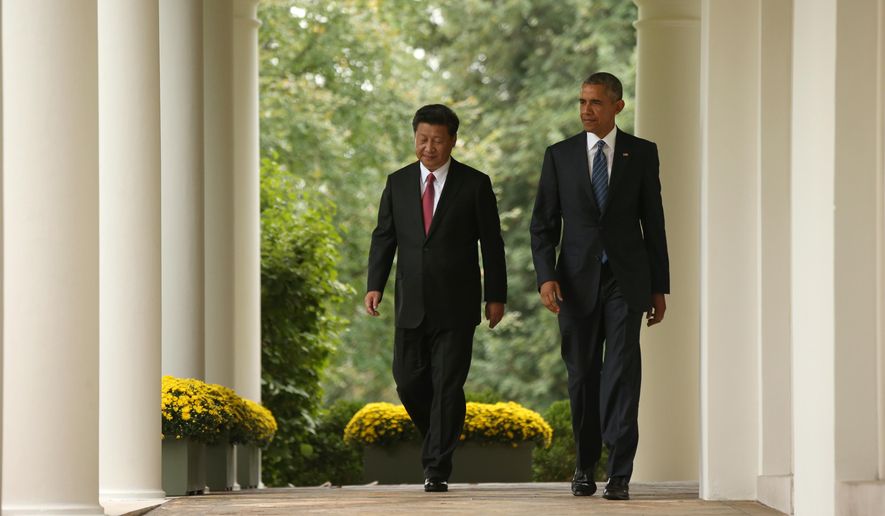President Obama claimed victory on cybersecurity after last week’s meeting with his Chinese counterpart, and said he’s received assurances China no longer will tacitly support the hacking of American companies — but analysts say the deal is only a small step in the right direction and does not guarantee either nation will cease all forms of spying or cybertheft.
During a press conference with Chinese President Xi Jinping, Mr. Obama said China has promised to crack down on cybertheft and will actively pursue hackers who steal intellectual property and other sensitive information from U.S. firms.
The agreement comes at a time of high tension between the two nations on the issue of cybersecurity. The Obama administration last year charged five officers in China’s People Liberation Army for hacking into the computer systems of six companies — including household names such as Westinghouse and Alcoa — and stealing sensitive information.
Intelligence officials also believe Chinese hackers are behind the recent massive cyberattack on Office of Personnel Management computer systems, though the administration has not yet formally named a responsible party.
While specialists say the U.S.-China cybersecurity deal is limited, at best, the president cast it as a key step forward in the two nations’ relationship.
But even he acknowledged the agreement does not mean the end of all hacking.
SEE ALSO: Xi Jinping calls for cyber dialogue between China, U.S. as sanctions talk looms
“President Xi, during these discussions, indicated to me that, with 1.3 billion people, he can’t guarantee the behavior of every single person on Chinese soil, which I completely understand. I can’t guarantee the actions of every single American,” Mr. Obama said during a Rose Garden press conference. “What I can guarantee, though, and what I’m hoping President Xi will show me, is that we are not sponsoring these activities, and that when it comes to our attention that non-governmental entities or individuals are engaging in this stuff, that we take it seriously and we’re cooperating to enforce the law.”
Mr. Obama and Mr. Xi specifically discussed economic espionage — the theft of business secrets and intellectual property for commercial gain. Other forms of hacking or cybertheft, analysts say, are likely to continue, even though neither leader would admit as much publicly.
“It addresses economic espionage only. This distinction is significant. China historically has not differentiated among various types of cyberespionage — essentially it believed that everything should be fair game, and if an entity wants to protect data, it should take all required steps to do so, whether the information relates to national security or business secrets,” said Robert Cattanach, a partner at the law firm Dorsey & Whitney and a former trial attorney with the Justice Department. “Thus, while only ’half a loaf,’ or perhaps even less, this still represents a significant step forward for protecting US interests.”
For his part, Mr. Xi said his country takes the issue just as seriously as the U.S.
“China strongly opposes and combats the theft of commercial secrets and other kinds of hacking attacks. The U.S. side, if has concerns in this respect, we can, through the exiting channels, express those concerns,” he said Friday. “The Chinese side will take seriously the U.S. provision of any information. Now, we have already, and in the future, we will still, through the law enforcement authorities, maintain communication and coordination on this matter, and appropriately address them.”
• Ben Wolfgang can be reached at bwolfgang@washingtontimes.com.




Please read our comment policy before commenting.